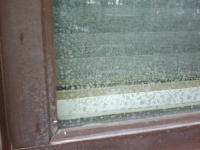

Hard Water Deposits
What Is Hard Water Deposit?Hard water deposits are derived from water that contains a high mineral content.This type of water usually consists of magnesium and calcium along with other compounds. These compounds are dissolved into the water as it passes through the ground. After the hard water has evaporated from a surface such as a window, it will leave water spots known as calcium deposits or lime scale. As this process continues over and over, the lime scale will continue to build up. At first it is not very noticeable, but after time, it will build to a thick white looking glaze. These deposits are fairly easy to remove during the beginning stages, but over time, the deposits will slowly etch into the pores of the glass, or are baked on by the sun. Once this happens, it can be virtually impossible to remove the deposits from the glass. As the build up continues, it will give your windows a rough texture and unpleasant haziness. Stages of Mineral Build UpStage One:This stage usually happens when hard water has been sprayed onto a window once or twice with ground water from a sprinkler or garden hose. After the water has evaporated, visible spots are left behind. These spots can usually be removed with regular window scrubbing tools along with normal scrubbing methods using a homemade window cleaner. Stage Two: At this stage the mineral deposit has started to build up to the point where it has a somewhat transparent, but white pasty look. At this point, it may be difficult (but not impossible) to remove with normal scrubbing. A Window Scraper and acid base or light abrasive glass cleaner may be needed to completely remove the scales.Stage Three: This is where the hard water deposits have build up to the point where they have etched into the pores of the glass, or have been baked on by the sun. You will know the damage has been done when the window scraper or cleaners will not remove the scale build up, no matter how hard you try. At this point, the window will have to be buffed out by using a special buffer, along with abrasive window buffing pads. This should only be done by a professional. If not done right, it will only cause further damage to the glass. As you can see from the picture, the scale build up has not only damaged the glass, but has damaged the frame as well. Hard Water Spot RemoverIf you do have stage 1 or stage 2 build up, there are certain types of cleaners that contain an abrasive or acid base that will help with the removal of hard water deposits. Acids help remove the deposits by breaking down their chemical bond. Some acid based cleaners that remove hard water build up can be found in toilet bowl cleaners, rust removers, metal cleaners and kitchen/bathroom cleaners. Cleaners that contain a mild abrasive specifically designed for glass may also be effective when removing hard mineral deposits.
Hard Water Prevention The most obvious way to prevent mineral build up is to avoid letting any hard water evaporate on your windows. Adjust sprinkler heads and do not pressure wash or spray windows with a garden hose. If you do, make sure all the water is removed using a squeegee before it has a chance to dry and leave water spots. Water Softening SystemsHomes with hard water may already have a water softening system for the inside water. Usually this system is not connected with the outdoor water source. It may be possible to run your outside water through the existing system. If this is not an option, you may consider a separate water softening system for the outside water as well. This is probably the most expensive method of prevention, but compared to the cost of replacing windows, it might be a good deal.Glass ProtectionIf a water softening system for your outside water source is not an option, and if ground water continues to be blown from sprinklers even after they have been adjusted, there is something you can do. There are hard surface protectants on the market that work great on glass. These products coat the surface of the glass, which creates a protective barrier. This basically waterproofs the glass, and allows water to bead off. This barrier will also keep hard water deposits from adhering to the glass. This type of product is hand buffed onto the glass in the same manner that you would wax a car. The only downfall to using this method is that when direct sunlight shines through the windows you might notice slight streak marks.
Hard Water Deposits
Window Cleaning Secret Solution | Cleaning Window Screens |


















